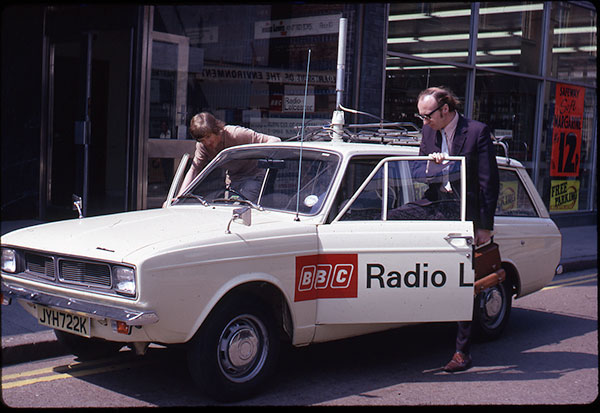BBC Radio Leicester started in 1967 and was the country’s first local BBC radio station. When the station ‘went digital’ around 2000/2001 its analogue collections – mostly ¼” tape – were deposited with the East Midlands Oral History Archive (EMOHA) and stored at the Record Office for Leicester, Leicestershire & Rutland (ROLLR).
We have previously written posts about the station’s transport series, ‘Platform’, the archaeology series, ‘Digging Out the Past’, and a collection of slides of the station from the 1970s. This blog is about the station’s weekly investigative journalism series, ‘In Perspective’, which covered issues of the day and ran through the 1970s. Over the years, some of these have been digitised by EMOHA on an ad hoc basis, mostly for teaching purposes at the University. Thanks to the UOSH project we have had a chance to preserve many more of these recordings.

The programmes reflect the issues of the 1970s very well and cover most of the political, social and economic stories that you might expect. The many general elections of the early 1970s are there, along with the three-day week, decimalisation, joining the ‘Common Market’, industrial disputes, and the start of mass unemployment. Local elections were covered, as well as many social issues that affected the city, such as homelessness, drug addiction, domestic abuse etc. Local personalities such as George Biddles (boxing promoter) and Frank Brierley (businessman) also make appearances.
It could be argued that the importance and usefulness of local BBC radio collections has been dismissed, or taken too lightly, in the past. Political or economic decisions made at a national, or even international, level affect people and places at a very local level, and this is what the BBC collections demonstrate. For example, global trends and international trade agreements decimated Leicester’s clothing industry in a relatively short period of time, and this is reflected in local radio programmes. The voices of workers, management, trade unionists, and local politicians, have been preserved by the UOSH project and are available to be listened to, often for the first time since they were broadcast nearly 50 years ago.
To take another example, it might be argued that reports on areas of Leicester that were about to be either slum cleared or renovated are too parochial to be of interest to anyone outside of Leicester. This would ignore that each of these local stories was an example of many such stories that were happening across the country. The slum clearances and redevelopments in cities across the UK were the result of policies made at a national level, sometimes reflecting major shifts in national opinions on how the built environment should be treated. Local radio programmes across the UK reflected how these policies were actually put into practice.
We are delighted that we have been able to preserve these programmes and believe they will be of interest not only to people from Leicester, Leicestershire and Rutland, but also to anyone with an interest of the history of the UK during the 1970s and beyond. Details of the programmes can be found on the British Library’s Sound and Moving Image catalogue and you can listen to the programmes by visiting the EMOHA at the University of Leicester or the ROLLR.
For a broader look at the story of BBC local radio, read Dr Matthew Linfoot’s article – https://www.bbc.com/historyofthebbc/research/local-radio


 Subscribe to Colin Hyde's posts
Subscribe to Colin Hyde's posts
Recent Comments